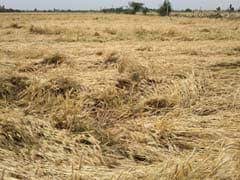MOGA: Latest spell of unseasonal rains in Punjab would delay the harvesting of wheat in almost all the districts by about two weeks.
Though, the state government has announced that its procurement centres would be ready for procurement of wheat from April 1 onwards but the officials of the state agriculture department say that harvesting of wheat would only begin after April 15 looking at the weather conditions.
The fresh spell of rainfall has farmers worried as they fear it would trigger fungal diseases, such as black point, which could affect the grain quality.
“The fresh spell of rain is not good for the wheat crop at this stage. It can trigger black point infection in the grains and affect the quality,” said Dr Jaswinder Singh Brar, Plant Protection Officer of Moga.
Though there has been no outbreak of black point infection but its symptoms could be known only after the harvest.
The black point-affected wheat grain typically turns dark at the embryo end of the grain, resulting in discolouration of the grains.
“Late harvesting coupled with excessive rainfall can result in overall poor grain quality”, Dr Brar said.
He said the test weight (grain weight per unit volume or grain density) was one of the grain quality traits most likely to be affected by delay in harvest due to persistent wet conditions. The low test weights usually occur if the grain is prevented from filling completely or maturing and drying naturally in the field. Rewetting of grain in the field after maturity but prior to harvest was one of the main causes of reduced test weight, he said.
Additionally, the grain would swell each time it is rewetted and may not return to its original size as it dries which will also reduce test weight. Thus, the enlarged kernels will take more space but weigh the same, allowing fewer kernels to pack in the measuring container, lowering the test weight. “Rain and harvest delay may also lead to pre-harvest sprouting in some varieties”, he added.
To minimise grain quality losses, it is better to harvest wheat on the first dry-down. Harvesting at a slightly higher moisture level of 18 per cent may also be useful for minimising the quality losses. However, it should be dried down below 15 per cent moisture level before selling in the markets for storage.
As per the specifications for procurement of wheat and barley by the Food Corporation of India (FCI), the moisture in excess of 12 per cent and up to 14 per cent would be discounted at full value. However, stocks containing moisture in excess of 14 per cent would be rejected by the procurement agencies.
The other relaxations by FCI include 2 per cent discoloured, 4 per cent slightly damaged, 6 per cent shrivelled and broken, 2 per cent other grain, and 0.75 per cent foreign matters will be permissible. The union government has already directed the FCI to grant 2 per cent relaxation in moisture content.
“However due to rainfall, winds and hailstorm the quality of wheat grain has deteriorated and we want relaxation in the norms for procurement from the union government,” said Kuldeep Singh Dhaliwal the agriculture minister of the state.


